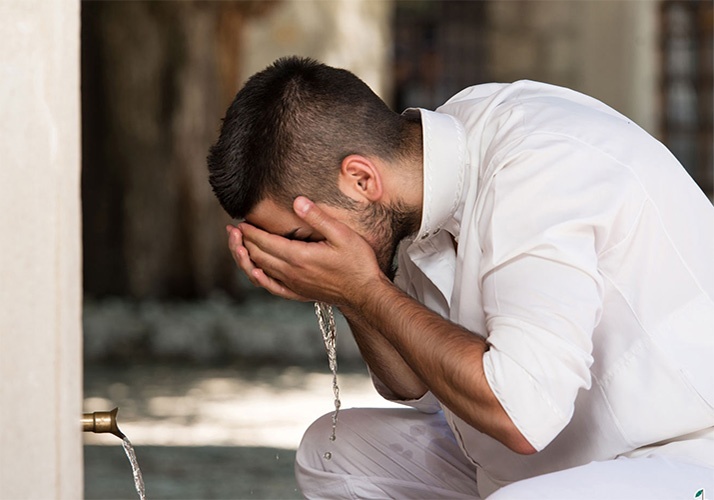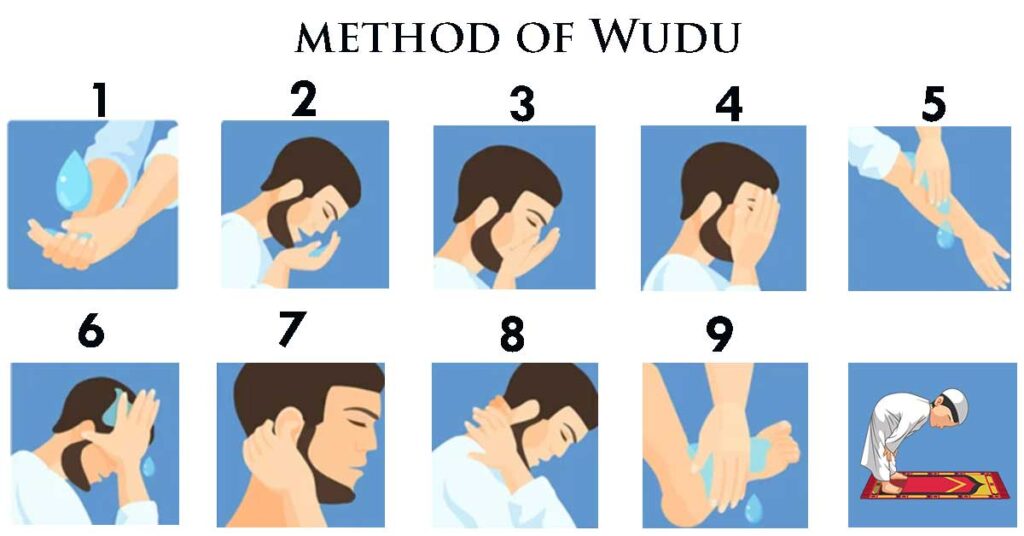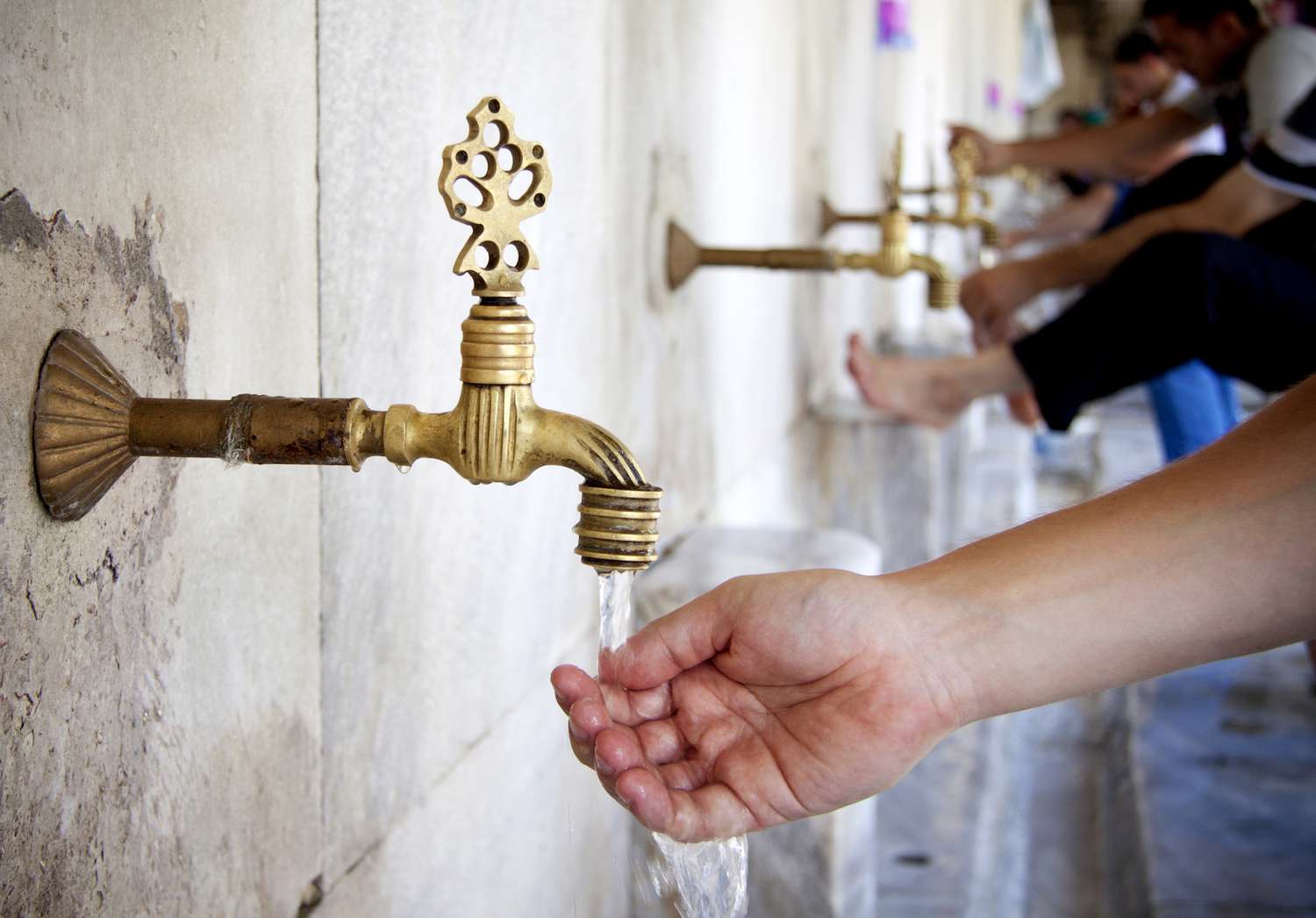Introduction
In Islam, Wudu holds great significance as it is a fundamental ritual of purification. The word “Wudu” comes from Arabic, meaning “ablution” or “purification.” It is a physical and spiritual act performed by Muslims before engaging in acts of worship, such as prayer or reciting the Quran. Wudu not only cleanses the body but also symbolizes a state of spiritual purity. This article on Arabian tongue explores the importance, steps, and benefits of performing Wudu in Islam.
What is Wudu?

Wudu is a ritual cleansing process that involves washing specific parts of the body using clean water. It is a prerequisite for various acts of worship in Islam. Wudu is seen as a means of purifying oneself, both physically and spiritually, before engaging in acts of devotion and seeking closeness to Allah.
Importance of Wudu in Islam
Wudu holds immense importance in Islam for several reasons. Firstly, it is considered a means of attaining ritual purity, which is essential for performing acts of worship, including Salah (prayer). Muslims are required to be in a state of ritual purity before standing before Allah in prayer. Wudu helps create a sense of cleanliness and reverence for the act of worship.
Ritual Purity in Islam
Wudu serves two primary purposes: the purification of the body and the purification of the soul. It is believed that through the physical act of Wudu, a person’s sins are washed away, allowing them to approach Allah with a pure heart and mind.
Steps of Wudu

If you are wondering about how to perform wudu, performing wudu involves a specific sequence of actions. These steps ensure that every part of the body intended for purification is cleansed thoroughly. The steps of Wudu are as follows:
Intention (Niyyah)
One should have the intention to perform Wudu for the sake of Allah’s pleasure and to prepare for prayer or any other act of worship.
Washing the hands
Begin by washing both hands up to the wrists three times, ensuring that water reaches between the fingers.
Rinsing the mouth and nose
Take a handful of water and rinse the mouth three times, making sure to swirl the water around. Then, sniff water into the nostrils and blow it out gently.
Washing the face
Use both hands to wash the entire face three times, from the hairline to the chin and from ear to ear.
Washing the arms
Starting with the right arm, wash from the fingertips up to and including the elbows three times. Repeat the same for the left arm.
Wiping the head
Moisten the hands and wipe the entire head once, starting from the forehead and moving towards the back of the head.
Washing the feet
Begin with the right foot, washing it up to and including the ankles three times. Repeat the same for the left foot.
Order and repetition
It is important to follow the specific order of body parts and repeat each step three times, ensuring thorough purification.
Sunnah Acts of Wudu
While the above steps are the essential requirements of wudu, there are also recommended acts, known as Sunnah in Islam, that can be incorporated for additional blessings. Some of these Sunnah acts include:
- Reciting the Basmala: Begin Wudu by reciting “Bismillah” (In the name of Allah).
- Brushing the teeth: Using a toothbrush or a Miswak (a traditional teeth-cleaning twig), gently brush the teeth to maintain oral hygiene.
- Using a Miswak: The use of a Miswak is highly encouraged as it has numerous benefits, including spiritual and physical purification.
Invalidators of Wudu

In Islamic studies for Wudu, there are some invalidations that may invalidate Wudu.
Certain actions and conditions invalidate Wudu, requiring its repetition before engaging in acts of worship. Some common invalidators include:
- Major and minor impurities: Any form of impurity, such as urine, feces, or blood, requires the performance of Wudu.
- Passing wind: The release of gas from the anus nullifies Wudu.
- Urination and defecation: The act of urinating or defecating requires the repetition of Wudu.
- Deep sleep: Falling into a deep sleep, where one loses awareness of their surroundings, nullifies Wudu.
- Touching the private parts: Direct contact with the genitals without any barrier invalidates Wudu.
Performing Wudu in Specific Situations
The requirement of Wudu can vary in specific situations. Here are a few examples:
Wudu for prayer
Wudu is mandatory before performing Salah (prayer). Muslims must be in a state of ritual purity to stand before Allah in prayer.
Wudu during travel
While traveling, Wudu remains valid as long as it is not nullified. However, there are concessions for performing Tayammum (dry ablution) if water is not readily available.
Wudu for ablution (Ghusl)
Ghusl is a type of tahara a complete ritual bath performed after specific acts, such as sexual intercourse or menstruation. It is obligatory to perform Wudu after completing Ghusl.
Virtues and Rewards of Wudu
Performing Wudu has numerous virtues and rewards associated with it. Some of the benefits include:
Spiritual purification
Wudu purifies the soul, washing away sins and allowing a person to approach Allah in a state of purity.
Entering a state of purity
Wudu creates a physical and spiritual state of cleanliness and purity, preparing the worshipper for acts of devotion.
Gaining closeness to Allah
By performing Wudu, Muslims seek closeness to Allah, as they engage in acts of worship with a purified body and soul.
Recommended: Learn Online Quran Memorization Course
Common Misconceptions about Wudu
There are certain misconceptions regarding Wudu that need clarification. It is crucial to understand the true essence of this ritual. Some common misconceptions include:
- Wudu as a form of hygiene: While Wudu involves cleansing the body, its primary purpose is spiritual purification rather than hygiene alone.
- Wudu as a mere ritual: Wudu is not a mere ritualistic practice; it is an act of worship and a means of attaining closeness to Allah.
FAQs
Can Wudu be performed using only water?
Yes, Wudu requires clean water for its proper performance. Using only water without any additives or substances is sufficient for Wudu.
Can someone else perform Wudu on behalf of another person?
No, Wudu is a personal act of purification that each individual must perform themselves.
What should one do if they cannot find water for Wudu?
If water is not available or cannot be used due to health reasons, one can perform Tayammum, a dry ablution using clean earth or dust, as a substitute for Wudu.
Does Wudu need to be repeated after using the restroom?
Yes, using the restroom invalidates Wudu, and it must be performed again before engaging in acts of worship.
Can Wudu be performed while wearing nail polish?
It is recommended to remove nail polish before performing Wudu, as water needs to reach the surface of the nails for complete purification.
Conclusion
Wudu is a vital aspect of Islamic worship, serving as a means of physical and spiritual purification. It holds great significance for Muslims, as it prepares them for acts of devotion and allows them to approach Allah in a state of ritual purity. By following the prescribed steps and incorporating the recommended acts, Muslims can benefit from the virtues and rewards associated with Wudu.


